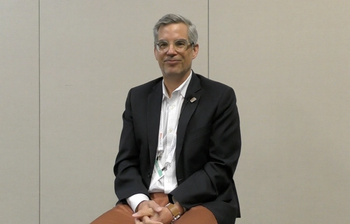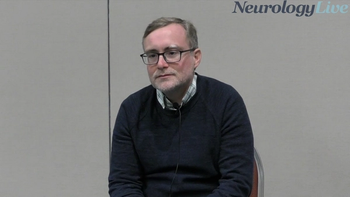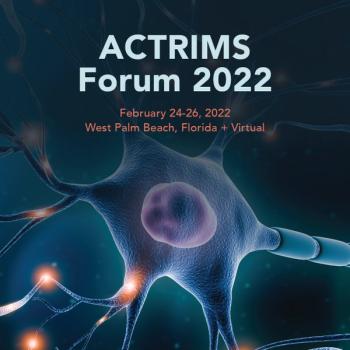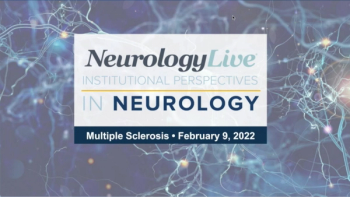
The executive vice president of the National MS Society spoke on recently published data suggesting the relationship between EBV and MS, also sharing his opinion on the potential of vaccines. [WATCH TIME: 2 minutes]

The executive vice president of the National MS Society spoke on recently published data suggesting the relationship between EBV and MS, also sharing his opinion on the potential of vaccines. [WATCH TIME: 2 minutes]

The pediatric epileptologist at Cleveland Clinic provided insight on her presentation at the 2022 AAN Annual Meeting that evaluated ganaxolone in phase 3 study of patients with CDKL5 deficiency disorder. [WATCH TIME: 4 minutes]

Most trials that reported on MS-related fatigue measured its change from baseline and whether that change was statistically significant.

The assistant professor of neurology at the University of Pennsylvania discussed his abstract at ACTRIMS Forum using 7T MRI features of newly developed MS lesions to predict chronic active lesions. [WATCH TIME: 4 minutes]

Regardless of prophylactic or therapeutic paradigms, treatment with evobrutinib resulted in significantly reduced disease severity and improvement of immunopathological parameters of MS disease.

The executive vice president of the National MS Society spoke on the primary theme of ‘biomarkers’ at this year’s meeting, as well as the areas he believes require the most attention for patients with MS. [WATCH TIME: 3 minutes]

Three-year follow-up data presented at the ACTRIMS Forum 2022 suggest cortical lesion burden, particularly subpial lesions, is the primary driver of worsening disability and conversion to secondary progressive MS.

Mechanistic data from the phase 2 REPAIR-MS trial support blinded efficacy data from the VISIONARY-MS trial, suggesting that Clene Nanomedicine’s investigational CNM-Au8 has the potential to drive clinically meaningful improvements in recognized MS functional end points.

A pair of datasets from the CLASSIC-MS and GLIMPSE studies of cladribine (Mavenclad; EMD Serono) suggest that the oral tablet sustained delayed conversion to clinically definite MS as well as favorable efficacy to dimethyl fumarate, fingolimod, and teriflunomide.

Using a diagnostic threshold of at least 1 paramagnetic rim lesion, MS was identified with a sensitivity of 80% and specificity of 88%, which increased to 95% after excluding patients with RIS and CIS.

Additional study is required to further investigate the integration of FES cycling into clinical practice for management of SPMS.

Investigators concluded that the Multiple Sclerosis Disease Activity test can assist in monitoring therapeutic response to glatiramer acetate and biologic agents.

At the ACTRIMS Forum 2022, the executive vice president of the National MS Society commented on the need to diagnose and initiate treatment for MS early, as well as employing wellness strategies to reduce risk of comorbidities. [WATCH TIME: 4 minutes]

At the 12- and 24-week time points, patients in both diet groups demonstrated statistically significant differences in total cholesterol, low-density lipoprotein, body weight, and body mass index.

For patients who remained on 60-mg tolebrutinib through Part B of the study, the number of new Gadolinium-enhancing lesions and new/enlarging T2 lesions remained low.

Investigators caution health care providers to consider specific risks of severe COVID-19 infection before initiating this therapy.

The executive vice president of the National MS Society spoke on the updated data from an analysis on economic burden, which illustrated the ‘staggering’ impact of the disease. [WATCH TIME: 4 minutes]

Investigators conducted a study to assess the effects of CR diet on immune cell subsets, concluding that observed changes could be mediated by changes in classes of lipid metabolites.

There were no statistically significant differences in infusion-related reactions among patients with multiple sclerosis who tested positive or negative for treatment-emergent antidrug antibodies.

The professor of neurology at Cleveland Clinic and president of ACTRIMS noted his excitement for this year’s Forum, which will feature presentations on a variety of topics in the field of multiple sclerosis. [WATCH TIME: 2 minutes]

After 12 months of treatment, the 2 disease-modifying therapies were comparable in efficacy, with less treatment switching and discontinuation in cladribine-treated patients.

After Rapid LVO installation, CTA to groin puncture time decreased and 90-day clinical outcomes, expressed using modified Rankin Scale, were improved.

The study found the approach could be utilized in the intensive care unit without adverse effects on neurological or functional outcomes.

ACTRIMS president Jeffrey Cohen, MD, offered insight into what’s to come from the upcoming Americas Committee for Treatment and Research in Multiple Sclerosis Annual Forum 2022.

The director of the Multiple Sclerosis and Neuromyelitis Optica Unit at Massachusetts General Hospital commented on presentations given at the recent event, as well as key takeaways from his own discussion on novel imaging approaches in multiple sclerosis. [WATCH TIME: 2 minutes]

There was no significant association between Black race and clinical outcome following mechanical thrombectomy.

The director of the Multiple Sclerosis and Neuromyelitis Optica Unit at Massachusetts General Hospital outlined a presentation he gave at a recent Institutional Perspectives in Neurology: MS event. [WATCH TIME: 3 minutes]

Kristin Galetta, MD, MSEd, provided insight on differences between B-cell depleting disease-modifying therapies for MS and how they continue to shape the future of drug development.

The data safety monitoring board reviewed 90-day outcomes for the first 200 patients, recommending that investigators continue the study as it currently stands.

Chaired by Eric Klawiter, MD, MSc, the presentations also feature Mass General and Brigham and Women's experts Tanuja Chitnis, MD; Kristin Galetta, MD; and Michael Levy, MD, PhD. [WATCH TIME: 1 hour, 26 minutes]